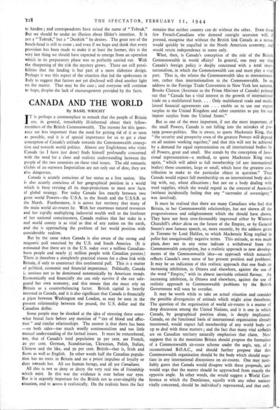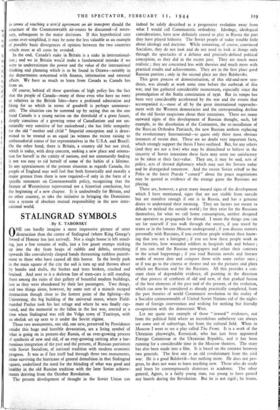CANADA AND THE WORLD
By BASIL WRIGHT
IT is perhaps a commonplace to remark that the people of Britain are, in general, remarkably ill-informed about their fellow- members of the British Commonwealth. The reasons for this ignor- ance are less important than the need for getting rid of it as soon as possible, and it is of special importance for us to get a clear conception of Canada's attitude towards the Commonwealth concep- tion and towards world politics. Almost any Englishman who visits Canada (as I have just done) finds himself profoundly concerned with the need for a close and realistic understanding between the people of the two countries on these vital issues. The old romantic clichés of an outworn Imperialism are not only out of date, they are also dangerous.
Canada is acutely conscious of her status as a free nation. She is also acutely conscious of her geographical position in a world which is busy revising all its map-projections to meet new facts of global strategy. For today Canada lies exactly between two great world Powers—the U.S.A. to the South and the U.S.S.R. to the North. Furthermore, it is across her territory that many of the main world air-routes lie. With her enormous natural resources and her rapidly multiplying industrial wealth well to the forefront of her national consciousness, Canada realises that her stake in a real world comity is as vital as that of any nation on the earth, and she is approaching the problem of her world position with considerable realism.
But by the same token Canada is also aware of the strong and magnetic pull exercised by the U.S. and South America. (It is estimated that there are in the U.S. today over a million Canadian- born people and nearly 3i million people with Canadian parents.) There is therefore a COmpletely practical reason for a close link with Britain, if only to counteract this continental pull. This is a matter of political, economic and financial importance. Politically, Canada is anxious not to be dominated automatically by American trends. Economically and financially she can only survive if she can safe- guard her own economy, and this means that she must rely on Britain as a counterbalancing factor. British capital is heavily invested in Canada, and it is also significant that Canada is financially a piyot between Washington and London, as may be seen in the present relationship between the pound, the U.S. dollar and the Canadian dollar.
Some people may be shocked at the idea of stressing these some-
what brutal facts before any mention of "ties of blood and affec- tion" and similar relationships. The answer is that there has been —on both sides—too much woolly sentimentalism and too little mutual understanding of the factual issues. It must be remembered, ton, that of Canada's total population 30 per cent. are French, 20 per cent. German, Scandinavian, Ukrainian, Polish, Italian, Chinese and the like, and 50 per cent. British—that is, Irish and Scots as well as English. In other words half the Canadian popula- tion has no roots in Britain and no a priori impulses of loyalty or duty towards her. All are human beings, and all are Canadians.
All this is not to deny or decry the very real ties of friendship which exist. In this war the evidence is ever before our eyes. But it is urgently important for the British not to over-simplify the situation, and to assess it realistically. On the realistic basis the fact
remains that neither country can do without the other. Even those few French-Canadians who demand outright secession will, if pressed, recognise that without the British link Canada as a nation would quickly be engulfed in the North American economy, and would retain independence in name only.
What, then, is Canada's conception of the role of the British Commonwealth in world affairs? In general, one may say that Canada's foreign policy is deeply concerned with a total inter- nationalism, in which the Commonwealth can and must play a vital part. That is, she relates the Commonwealth idea to international- ism, rather than internationalism to the Commonwealth. In an address to the Foreign Trade Convention in New York last autumn, Brooke Claxton (Assistant to the Prime Minister of Canada) pointed out that "Canada has a vital interest in the growth of international trade on a multilateral basis. . . . Only multilateral trade and multi- lateral financial agreements can . . . enable us to use our export surplus to the United Kingdom and other countries to pay for our import surplus from the United States."
But as one of the most important, if not the most important, of the small Powers, Canada is not falling into the mistakes of pre- 5939 power-politics. She is aware, to quote Mackenzie King, that "the security and prosperity even of the greatest Powers will depend on all nations working together," and that this will not be achieved by a demand for equal representation on all international bodies by all Powers, great and small. She stands by the conception of func- tional representation—a method, to quote Mackenzie King once again, "which will admit to full membership (of any international bodies) those countries, large or small, which have the greatest con- tribution to make to the particular object in question." Thus Canada would expect full membership on an international body deal- ing with, say, wheat allocations ; but not on a body dealing with wool supplies, which she would regard as the concern' of Australia (without incidentally feeling that any "surrender of sovereignty" was involved).
It must be realised that there are many Canadians who feel that Britain, in her Commonwealth relationships, has not shown all the progressiveness and enlightenment which she should have shown. They have not been over-favourably impressed either by Winston Churchill's obiter dicta on the future of the Empire, or by General Smuts's now famous speech, or, more recently, by the address given in Toronto by Lord Halifax, to which Mackenzie King replied in polite but unequivocally negative terms. This attitude, as was made plain, does not in any sense indicate a withdrawal from the Commonwealth conception, but a realistic approach to new develop- ments of the Commonwealth idea—an approach which naturally reflects Canada's own sense of her present position and problems. It may be an indication of this realistic approach that one finds an increasing inhibition, in Ottawa and elsewhere, against the use of the word "Empire," with its almost inevitable colonial flavour. An increasing inhibition, in Ottawa and elsewhere, against the use of realistic approach to Commonwealth problems by the British Government will soon be overdue.
It may be worth while to take an actual situation and consider the possible divergencies of attitude which might arise therefrom. The question of the organisation of world air-routes is a matter of deep discussion among the United Nations, and it is one in which Canada, by geographical position alone, is deeply implicated. Canada, on the functional basis of international organisation already mentioned, would expect full membership of any world body set up to deal with these matters ; and the fact that many vital airfields are on Canadian territory naturally emphasises that claim. Now suppose that in the meantime Britain should propose the formation of a Commonwealth air-route scheme under the aegis, say, of a reconstituted B.O.A.C., and should further propose that this Commonwealth organisation should be the body which should nego- tiate in any international discussions on air-routes. One may justi- fiably guess that Canada would disagree with these proposals, and would urge that the matter should be approached from exactly the) opposite angle. In other words, she would suggest a World Con- ference at which the Dominions, equally with any other nations vitally concerned, should be individual'y represented, and that only in terms of reaching a word agreement on air transport should the structure of the Commonwealth air-mutes be discussed—if neces- sary, subsequent to the major decisions. If this hypothetical case seems over-simplified, it may be none the less valuable as an example of possibly basic divergences of opinion between the two countries which must at all costs be avoided.
In the end, Canada's stake in 'Britain is a stake in international- ism ; and we in Britain would make a fundamental mistake if we were to underestimate the power and the value of the international thinking and planning which is to be found in Ottawa—notably in the departments concerned with finance, information and external affairs. We have as much to learn from Canada as Canada has from us.
Of course, behind all these questions of high policy lies the fact that the people of Canada--rnany of those even who have no roots or relatives in the British Isles—have a profound admiration and liking for us which in terms of goodwill is perhaps unmeasur- able. The situation can be summed up by saying that on the one hand Canada is a young nation on the threshold of a great future, deeply conscious of a growing sense of Canadianism and not un- naturally very sensitive of her nationhood ; she has little sympathy for the old "mother and child" Imperial conception and is deter- mined to be treated as an equal (as witness the recent raising to ambassadorial status of her representatives in the U.S.A. and Brazil). On the other hand, there is Britain, a country old but not tired, which is today, with deep concern, seeking a new place and orienta- tion for herself in the comity of nations, and not unnaturally finding it not too easy to rid herself of some of the habits of a lifetime. In any appraisement of the present situation as regards Canada, the people of England may well feel that both historically and morally a major gesture from them is now required—if only in the form of a specific statement on Commonwealth policy, recognising that the Statute of Westminster represented not a historical conclusion, but the beginning of a new chapter. It is undoubtedly for Britain, and no other country, to take the initiative in bringing the Dominions into a system of absolute mutual responsibility in the new inter- national world.



























 Previous page
Previous page